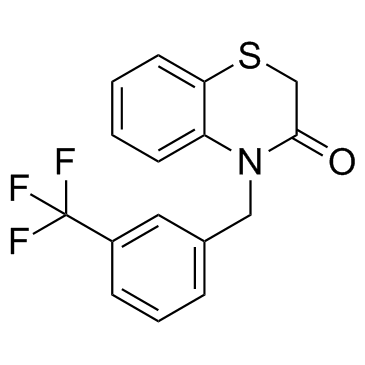
NS6180
CAS No. 353262-04-1
NS6180( NS6180 | NS-6180 | NS 6180 )
Catalog No. M14204 CAS No. 353262-04-1
NS6180 is a novel potent and selective KCa3.1 channel inhibitor(IC50= 9 nM) prevents T-cell activation and inflammation.
Purity : >98% (HPLC)
 COA
COA
 Datasheet
Datasheet
 HNMR
HNMR
 HPLC
HPLC
 MSDS
MSDS
 Handing Instructions
Handing Instructions
| Size | Price / USD | Stock | Quantity |
| 2MG | 38 | In Stock |


|
| 5MG | 58 | In Stock |


|
| 10MG | 97 | In Stock |


|
| 25MG | 212 | In Stock |


|
| 50MG | 347 | In Stock |


|
| 100MG | 516 | In Stock |


|
| 200MG | Get Quote | In Stock |


|
| 500MG | Get Quote | In Stock |


|
| 1G | Get Quote | In Stock |


|
Biological Information
-
Product NameNS6180
-
NoteResearch use only, not for human use.
-
Brief DescriptionNS6180 is a novel potent and selective KCa3.1 channel inhibitor(IC50= 9 nM) prevents T-cell activation and inflammation.
-
DescriptionNS6180 is a novel potent and selective KCa3.1 channel inhibitor(IC50= 9 nM) prevents T-cell activation and inflammation.
-
In VitroNS6180 (0.001-1 μM) shows inhibition of human KCa3.1 with an IC50 value of 9.4 nM and a K50 value of 11 1.7 nM, respectively.NS6180 (30 nM, 10 μM) has inhibition that dependent on amino acid residues T250 and V275.NS6180 (1, 10, 100 and 1000 nM; 1 min) shows CCCPreportedhyperpolarizations of human erythrocytes. NS6180 (1, 10, 100 and 1000 nM; 1 min) blocks the erythrocyte KCa3.1 channels with IC50 values of 14 nM (human KCa3.1 channels), 15 nM (mouse) and 9 nM (rats), respectively.NS6180 (0-5 μM, 48 h) suppresses rat and mouse splenocyte proliferation at submicrolar concentrations and potently inhibited IL-2 and IFN-g production, while exerting smaller effects on IL-4 andTNF-α and no effect on IL-17 production.
-
In VivoNS6180 (i.v., i.p. and oral administration; 10 mg/kg; twice daily or once daily) has extremely low bioavailability and reduces DNBS-induced experimental colitis in rats. Animal Model:Rats Dosage:10 mg/kg Administration:i.v., i.p. and oral administration; 10 mg/kg; twice daily or once daily Result:Had a plasma half-life of 3.8 h, oral or i.p. administration gave low plasma exposure (Cmax: 186 nM and 33 nM, respectively, after administration of 10 mg/kg).
-
SynonymsNS6180 | NS-6180 | NS 6180
-
PathwayCell Cycle/DNA Damage
-
TargetPotassium Channel
-
RecptorKCa3.1 channel
-
Research AreaInflammation/Immunology
-
Indication——
Chemical Information
-
CAS Number353262-04-1
-
Formula Weight323.33
-
Molecular FormulaC16H12F3NOS
-
Purity>98% (HPLC)
-
SolubilityDMSO: 100 mM
-
SMILESO=C1CSC2=CC=CC=C2N1CC3=CC=CC(C(F)(F)F)=C3
-
Chemical Name4-[[3-(Trifluoromethyl)phenyl]methyl]-2H-1,4-benzothiazin-3(4H)-one
Shipping & Storage Information
-
Storage(-20℃)
-
ShippingWith Ice Pack
-
Stability≥ 2 years
Reference
1. Strobak D, et al. Br J Pharmacol. 2013 Jan;168(2):432-44.
molnova catalog



related products
-
LY2334737
LY2334737 is an orally available prodrug of gemcitabine with antineoplastic activity.
-
Azimilide
A class ΙΙΙ antiarrhythmic agent that blocks hERG channel; blocks HERG channel at 0.1 and 1 Hz with IC50s of 1.4 uM and 5.2 uM respectively.
-
BMS-919373
BMS-919373 is a potent I(Kur)/Kv1.5 channel blocker with IC50 of 50 nM.



 Cart
Cart
 sales@molnova.com
sales@molnova.com


